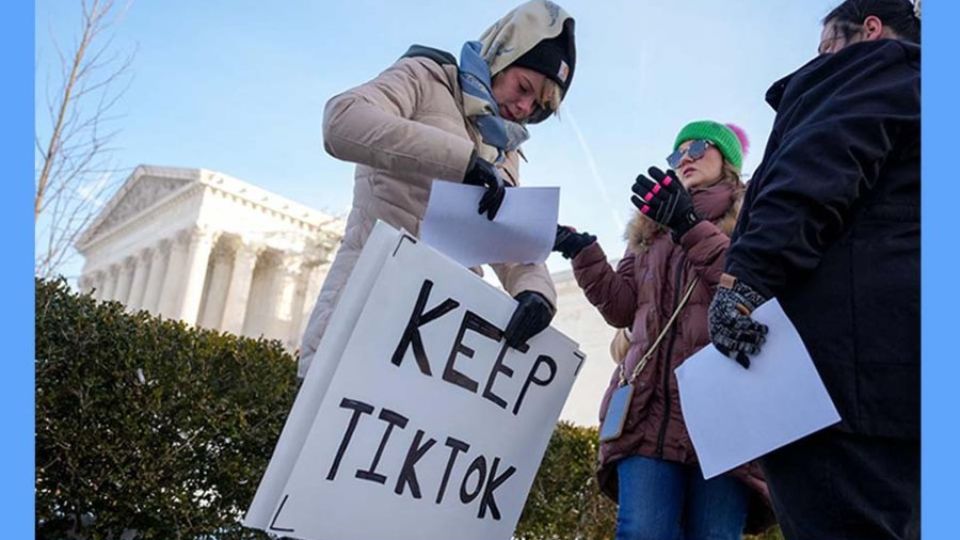January 14, 2025
NEW YORK – The general sentiment in the United States that the Supreme Court will likely uphold a law that would ban TikTok in the country has left a majority of its 170 million users in the US frustrated.
The ban on the immensely popular social media app would take effect on Sunday unless it is sold by its China-based parent company ByteDance, but such a sale is unlikely. ByteDance has said it will not sell TikTok despite several expressions of interest from potential buyers in the US.
The nine justices who heard arguments on Friday in a case of free speech versus national security concerns seemed persuaded that the alleged security threat posed by TikTok overrides concerns about restricting the freedom of speech and expression of its users in the US.
In arguments that lasted more than two and a half hours, Chief Justice John Roberts identified his main concern: TikTok’s ownership by ByteDance and what he said was its requirement to cooperate with the Chinese government’s intelligence operations.
TikTok, however, has repeatedly said it does not share information about its users with the Chinese government.
If left in place, the law passed by bipartisan majorities in Congress and signed by President Joe Biden in April will require TikTok to “go dark” on Sunday, lawyer Noel Francisco told the justices on behalf of TikTok.
Francisco urged the justices to clamp a temporary pause that would allow TikTok to keep operating. “We might be in a different world again” after President-elect Donald Trump takes office on Monday, he said.
Trump, who has 14.8 million followers on TikTok, has also called for the deadline to be deferred to give him time to negotiate a “political resolution”. Francisco served as Trump’s solicitor general in his first presidential term.
Justice Neil Gorsuch, whom Trump appointed, sounded like the only one who would side with TikTok’s argument that the ban violates the Constitution. He labeled arguments advanced by the Biden administration in defense of the law a “paternalistic point of view”.
TikTok, Gorsuch said, has offered to post a warning that the content could be manipulated. “Don’t we normally assume that the best remedy for problematic speech is counter speech?” he asked Solicitor General Elizabeth Prelogar, who defended the law for the Biden administration.
Prelogar argued that a warning would not be enough to counterbalance the spread of misinformation.
Francisco, TikTok’s lawyer, emphasized that the US has not presented any evidence that China has attempted to manipulate content or gather US users’ data, which TikTok maintains are stored on US servers.
“This country has never taken a step of shutting down a speech platform, much less such an important speech platform,” he said.
Jenin Younes, a civil liberties lawyer in Washington, DC, wrote to her 136,000 followers on social media platform X: “The case raises an incredibly important question: can Congress ban a social media platform on the grounds that it constitutes a national security risk? The answer should be NO. … especially where, as here, the government has failed to show the law is narrowly tailored to meet a compelling government interest.”
TikTok users who already have the app on their phones will continue to have access to it. However, new users will not be able to download it, and existing users will no longer be able to receive updates. That will eventually render the app unworkable, the US Justice Department said.
Dean Ball, a research fellow with the Mercatus Center, a think tank at George Mason University in Virginia, told The New York Times: “The letter of the law is about future downloads and updates. It is not about taking the app off people’s phones.”
TikTok, however, has not said if it will allow access to the app once banned, the Times reported.
If TikTok is not sold to an approved buyer, federal law would prohibit app stores from offering it. The law would also prohibit web-hosting service providers from carrying TikTok.
Many TikTok users in the US expressed their dismay over the looming ban.
“TikTok has contributed over $32 billion to the US economy in 2023,” InvestmentKage posted on X on Sunday. “It helps support millions of creators, some of these people couldn’t get a job because of disabilities, and the government wants to ban it. Again, the government doesn’t always have your best interest in mind.”
Skip Chapman, co-owner of KAFX Body, a deodorant maker in Manasquan, New Jersey, said, “There’s really no replacement for this app.”
Chapman noted that more than 80 percent of his sales are generated on TikTok, and that he has not found the same results on Amazon or other platforms.
Chloe Joy Sexton, a cookbook author in Memphis, Tennessee, said that TikTok has changed her life. Sexton started using the app when she was fired from her job for being pregnant. The app helped her launch her own business, Chloe’s Giant Cookies, she said.
“I have now shipped thousands of cookies all over the world and even published a cookbook. … I rely almost entirely on TikTok to market my products,” she added.
Prelogar, the US solicitor general, said an eventual sale of TikTok, even after the ban starts, would allow the platform to resume operations.
TikTok negotiated with the Biden administration between 2021 and 2022 to resolve concerns around US data privacy and the app’s algorithm.
In court documents, it has accused the administration of essentially walking away from those talks after it presented a draft agreement in August 2022.
A three-judge federal panel unanimously upheld the law last month, prompting TikTok’s appeal to the Supreme Court.


